How Many Calories Are In Baby Formula?
43 hours of research 3 minute read

Ensuring your baby gets the right amount of calories is essential for healthy growth and development. While many of us may focus on reducing calorie intake, babies are entirely different—they need adequate calories to support normal growth, maintain a healthy body weight, and meet their developmental milestones.
In this comprehensive guide, we’ll explore the importance of calories in baby formula, how to calculate your baby’s caloric needs and offer a comparison of popular European infant formula brands. Whether you’re a new parent or looking to switch formulas, this guide will provide you with the information you need to make an informed decision.
Understanding Calories in Infant Formula: What You Need to Know
Understanding Calories in Infant Formula: What You Need to Know
Calories aren't rocket science, but they are still a somewhat vague concept. Understanding them can help ensure your baby gets exactly what they need for healthy growth and development.
A calorie measures the energy released when the body breaks down food. The more calories per meal, the more energy your baby’s body will receive when digesting and absorbing the food. Calories are an essential part of your baby’s nutrition and provide the energy their body uses to grow. Low-calorie intake in young children can lead to problems like increased susceptibility to inflammation and infections.
To calculate how many calories your baby needs, you must account for their age, size, and sex.
General Calorie Recommendations for Infants:
For Males:
- 1 to 3 months: 472 to 572 calories/day
- 4 to 6 months: 548 to 645 calories/day
- 7 to 9 months: 668 to 746 calories/day
- 10 to 12 months: 793 to 844 calories/day
For Females:
- 1 to 3 months: 438 to 521 calories/day
- 4 to 6 months: 508 to 593 calories/day
- 7 to 9 months: 608 to 678 calories/day
- 10 to 12 months: 717 to 768 calories/day
Calories are a measurement of energy. In the context of infant nutrition, calories are crucial because they fuel your baby’s body for growth and development. The primary sources of calories in baby formula are carbohydrates, fats, and proteins.
Carbohydrates typically provide 4 calories per gram, with lactose being the most common carbohydrate in infant formulas. Some babies may be sensitive to lactose, and in such cases, formulas with lactose alternatives like sucrose, maltodextrins, or reduced-lactose options are available.
Fat is the most calorically dense macronutrient, containing 9 calories per gram. In formulas, fats are often derived from vegetable oils like soy, coconut, or palm oil.
Proteins provide 4 calories per gram and are typically sourced from cow’s milk, goat’s milk, or soy. Depending on the formula type, these proteins can be intact, partially hydrolyzed, or fully hydrolyzed for babies with specific needs.
How Many Calories Does Your Baby Need?
The number of calories your baby needs will depend on their age, weight, and overall health. Below is a general guideline for caloric intake:
General Calorie Recommendations for Infants:
For Males:
- 1 to 3 months: 472 to 572 calories/day
- 4 to 6 months: 548 to 645 calories/day
- 7 to 9 months: 668 to 746 calories/day
- 10 to 12 months: 793 to 844 calories/day
For Females:
- 1 to 3 months: 438 to 521 calories/day
- 4 to 6 months: 508 to 593 calories/day
- 7 to 9 months: 608 to 678 calories/day
- 10 to 12 months: 717 to 768 calories/day
Premature infants may require a different amount depending on their body weight, so it’s essential to consult with a pediatrician to calculate the exact caloric needs.
How to Calculate Your Baby’s Caloric Needs
To calculate the number of calories your baby needs, follow these steps:
- Convert Weight from Pounds to Kilograms: Multiply your baby’s weight in pounds by 0.45.
- Multiply by Caloric Needs per Kilogram: Once you have your baby’s weight in kilograms, multiply it by 100 kcal/kg (as a general guideline).
For example, if your baby weighs 7 lbs:
- 7 lbs × 0.45 = 3.15 kg
- 3.15 kg × 100 kcal/kg = 315 kcal/day
Calories in Popular European Infant Formula Brands
Choosing the right formula involves understanding the caloric content and ensuring it aligns with your baby’s needs. This expanded comparison allows parents to make informed decisions based on their baby's caloric needs at different stages of development. Here’s a comparison of calories in popular European infant formulas:
| Formula | Stage | Calories (Kcal) |
|---|---|---|
| HiPP German | ||
| Stage Pre | 66 | |
| Stage 1 | 67 | |
| Stage 2 | 68 | |
| Stage 2 - No Starch | 68 | |
| Stage 3 | 68 | |
| HiPP Dutch | ||
| Stage 1 | 66 | |
| Stage 2 | 68 | |
| Stage 3 | 60 | |
| Stage 4 | 51 | |
| HiPP UK | ||
| Stage 1 | 66 | |
| Stage 2 | 68 | |
| Stage 3 | 60 | |
| HiPP HA | ||
| Stage Pre | 66 | |
| Stage 1 | 69 | |
| Stage 2 | 70 | |
| HiPP Dutch Goat | ||
| Stage 1 | 66 | |
| Stage 2 | 68 | |
| Stage 3 | 60 | |
| HiPP Kindermilch | ||
| Stage 1 Year+ | 51 | |
| Stage 2 Year+ | 48 | |
| HiPP HA Dutch | ||
| Stage 1 | 67 | |
| Stage 2 | 68 | |
| HiPP Anti Reflux | German and UK | 67 |
| HiPP Comfort | German and UK | 66 |
| Kendamil Organic | ||
| Stage 1 | 66 | |
| Stage 2 | 66 | |
| Stage 3 | 65 | |
| Kendamil Classic | ||
| Stage 1 | 67 | |
| Stage 2 | 68 | |
| Stage 3 | 64 | |
| Kendamil Goat | ||
| Stage 1 | 66 | |
| Stage 2 | 66 | |
| Stage 3 | 65 | |
| Lebenswert | ||
| Stage 1 | 67 | |
| Stage 2 | 67 | |
| Stage 3 | 66 |
What is the calorie count of a 6-ounce formula bottle?
A typical 6 oz bottle of formula contains around 120-140 calories, depending on the brand and stage of the formula. This amount can vary slightly based on the specific formula used and its concentration.
Tips for Monitoring Your Baby's Growth and Caloric Intake
- Regular Checkups: Schedule regular pediatric visits to monitor weight and growth.
- Track Formula Intake: Keep a record of how much formula your baby consumes.
- Watch for Signs of Overfeeding or Underfeeding: Indicators include gassiness, vomiting, irritability, or lethargy.
Choosing the Best Formula for Your Baby
When selecting a formula, consider the nutritional content, and your baby’s specific needs, and consult with your pediatrician. Whether your baby needs a high-calorie formula or one designed for specific dietary restrictions, there are options available from reputable European brands.
Discover Premium European Infant Formulas
At our online store, we offer a curated selection of premium European infant formulas, including HiPP, Holle, Kendamil, Kabrita, and Nannycare. These formulas are made under strict European regulations, ensuring high quality and nutritional standards.
Save on Popular European Infant Formula Brands
At Organic Life Start, we specialize in offering a wide range of European formula products, from HiPP, Holle, Lebenswert, Kendamil, Nannycare, and Kabrita. You can explore our selection here and take advantage of the best deals by following these steps:
- Save up to 15% by ordering the largest size pack. Specific discounts vary between individual products.
- Save a further 5% by signing up for recurring billings via a subscription. Learn more about it here.
- Save a further 5% by using our welcome voucher code - FAMILY, if you are a first-time customer.
Ensuring Proper Nutrition with the Right Calories
Calories play a critical role in your baby’s growth and development. By choosing the right formula and monitoring your baby’s intake, you can support their healthy development. Always consult with your pediatrician to determine your baby’s specific nutritional needs.
For top-quality European formulas, visit our store and explore our wide selection designed to meet your baby’s unique needs.
Most Popular Baby Formulas Providing Essential Calories
Organic Life Start is committed to providing accurate, reliable, and trustworthy information to parents and caregivers. We carefully choose credible sources and follow a meticulous fact-checking process to uphold the highest standards in infant nutrition and parenting advice. To learn more about our dedication to accuracy, please explore our editorial guidelines.
Link To Sources


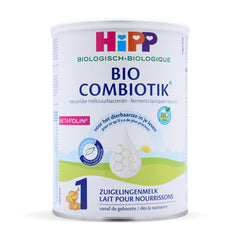
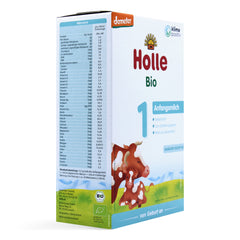
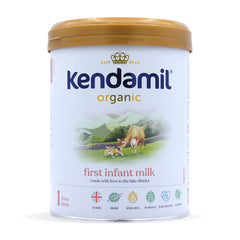
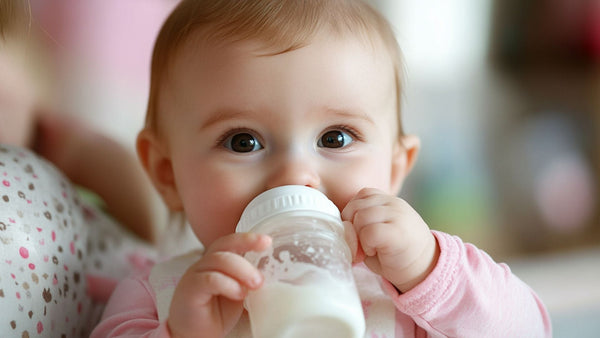


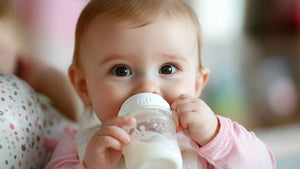


Whitney -
Reading about how many calories are in baby formula truly relieved me as a parent. I’m always very cautious about making sure my little child Angelo gets all the nutrition he needs in every bottle. I feel better knowing that his formula gives him the appropriate amount of nutrients so he can grow strong and healthy. It’s nice to see him happy, content, and doing well after each meal. It makes all the planning seem worth it. He is doing well with his HiPP Dutch formula.
Melvin Wakefield -
December 04, 2025
When I read about how many calories are in baby formula, it actually reassured me that my little Emman is getting everything he needs each day. Using Kendamil Organic for all his meals makes me feel confident that he’s hitting his daily calorie requirements without any worry. I think we made the right choice because he has been growing steadily and seems happy after each bottle. I like that his food gives him the nutrients he needs and makes him full. Even though it’s not important, it’s a nice break from all the problems parents have to deal with.
Yousef -
November 17, 2025
I’ve been extra careful about what I feed my little son Kobe, so learning about the calories in baby formula has become part of my routine. Since Kobe is drinking Holle Bio, I double-check every label just to make sure the nutrition matches what my growing boy needs. It’s reassuring to know that European formulas like Holle keep things simple and clean without confusing additives. Knowing how many calories Kobe is eating each day also makes me feel more sure about how much he is getting. In the end, I just want to know that every bottle really helps Kobe grow, and Holle Bio provides me with that peace of mind.